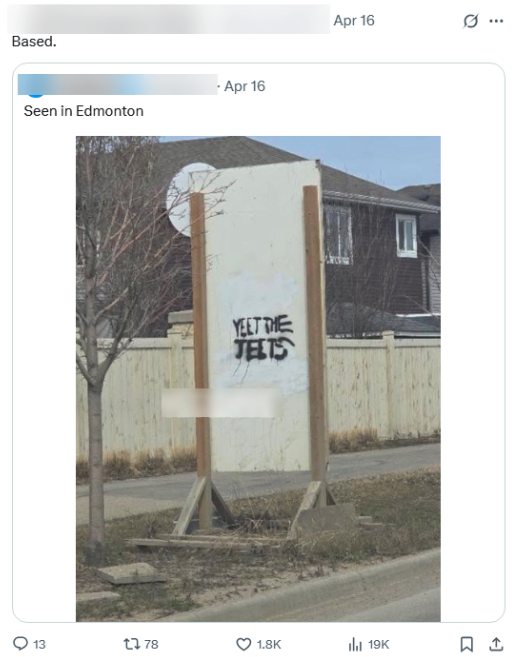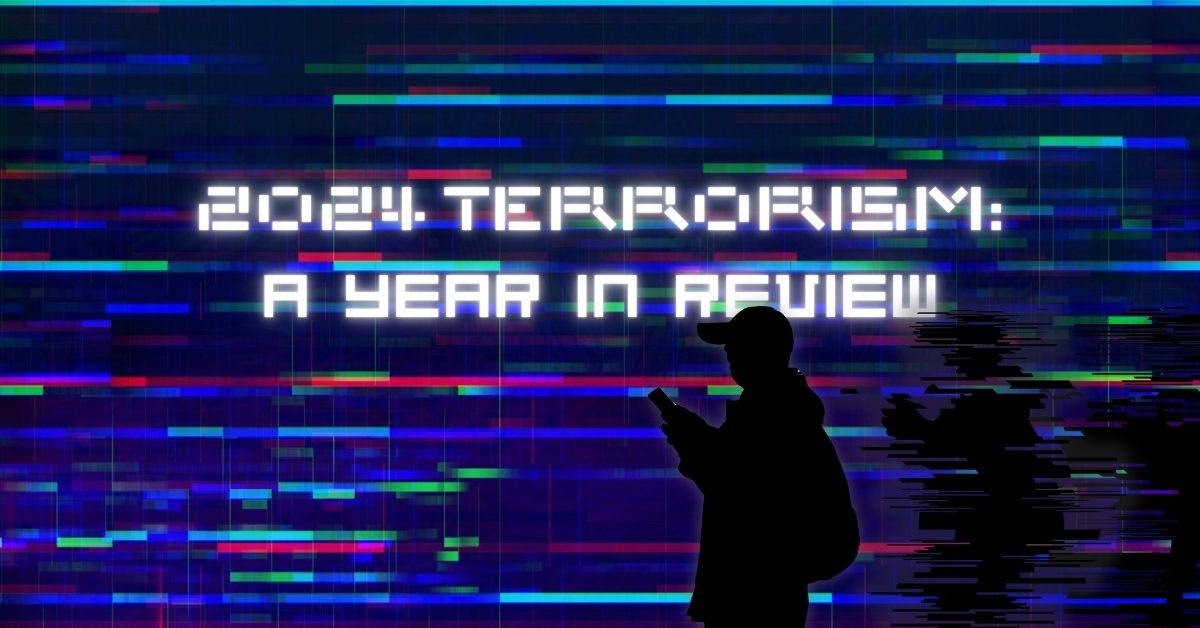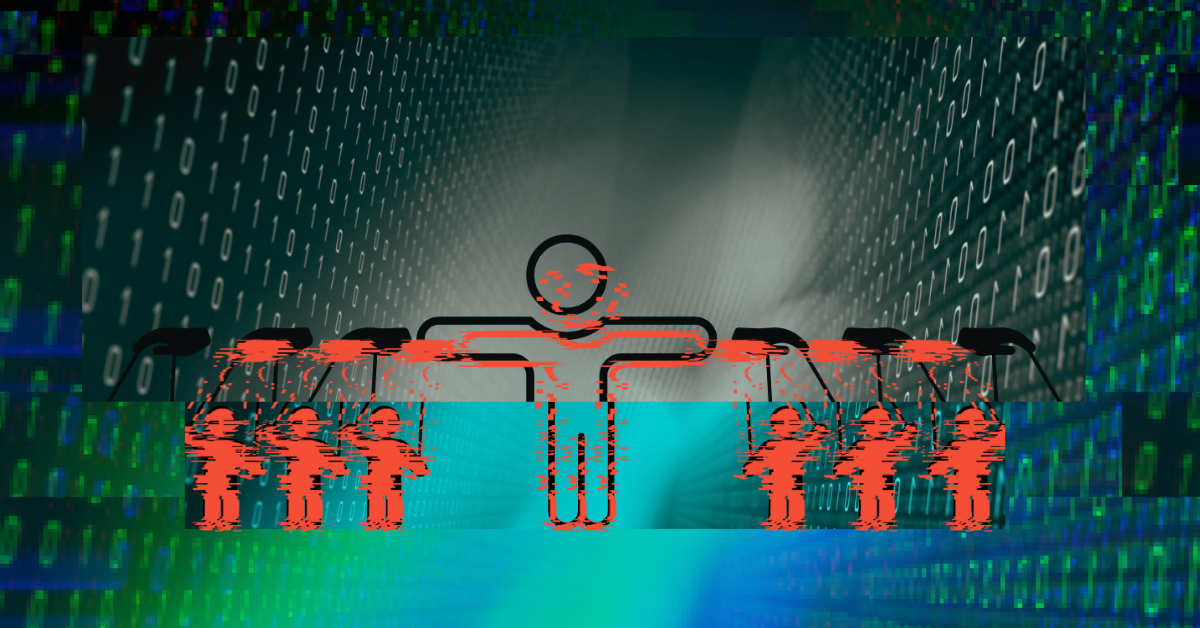The rise of anti-South Asian hate in Canada
26 June 2025
CONTENT WARNING: This article contains descriptions of hateful content and violent rhetoric.
In recent years, anti-South Asian hate in Canada has been skyrocketing both on- and offline, with hate crimes targeting these communities increasing by 227 percent between 2019 and 2023. This Dispatch examines this phenomenon using a combination of qualitative research, ethnographic monitoring and quantitative social media analysis.
Additionally, to help illustrate the types of networks promoting hateful discourse about South Asians in Canada, this Dispatch integrates a case study of the Canadian extremist group Diagolon, which has targeted these communities with hate speech, harassment and even calls for violence. Ultimately, the surge of this hate in Canada not only threatens the physical and psychological safety of South Asian communities but also deters affected individuals from civic engagement and weakens social cohesion.
This research is informed by ISD’s definition of targeted hate, which encompasses activity that seeks to dehumanize, demonize, harass, threaten, or incite violence against an individual or community based on religion, ethnicity, race, sex, gender identity, sexual orientation, disability, national origin, or migrant status.
Key takeaways
- There has been a marked rise in anti-South Asian hate in Canada over the past several years. Our analysis found that posts containing anti-South Asian slurs increased by more than 1,350 percent from 2023 to 2024 on X (formerly Twitter), with police-reported hate crimes against South Asians in Canada increasing by more than 227 percent between 2019 and 2023.
- Canadian domestic extremists are amplifying anti-South Asian hate at scale on social media. Between March 1 and April 20 2025, in the lead-up to Canada’s federal election, over 2,300 posts containing anti-South Asian rhetoric were shared across various platforms which collectively generated over 1.2 million engagements. A spike in such rhetoric occurred on April 17 in response to the Canadian election debate, which triggered an outsized amount of hate targeting New Democratic Party leader Jagmeet Singh.
- The white supremacist network Diagolon has been particularly virulent in spreading anti-South Asian hate. Leaders within this network regularly harass South Asians with targeted hate speech, which they believe will encourage their exit from the country.
- Diagolon leaders regularly target South Asian politicians and community groups and have popularized slogans demonizing South Asians in Canada. They also openly celebrate the death and suffering of these groups. Some of this rhetoric is violent in nature, which may jeopardize civic engagement and social cohesion.
The rise of anti-South Asian hate in Canada
A growing body of reporting shows that anti-South Asian hate in Canada is on the rise, and is often framed within discussions about limited housing and employment anxieties. This also manifests in physical violence: between 2019 and 2023, police-reported hate crimes against South Asians in Canada increased by more than 200 percent based on the latest data from StatsCan. South Asians were the third most targeted category for racial hate crimes in Canada in 2023 behind Black people and Arabs.
To better understand these figures, ISD analysts assessed anti-South Asian hate online across a broad cross-section of users using the social media monitoring tool Brandwatch, creating a query combining search terms related to Canadian regions/cities and South Asians on X. A search using explicitly hateful keywords showed a significant increase between May and December, rising from 1,163 posts in 2023 to 16,884 in the same period in 2024, before declining in recent months. This constitutes an overall increase of over 1,350 percent. While this rise could be influenced by content moderation efforts, either due to increased enforcement targeting older posts or a relative lack of moderation in more recent periods, the overall increase is nevertheless concerning.
The use of keywords such as slurs provides an indication of the scale of hate targeting South Asians. One of the most common is pajeet, an invented name which sounds ‘Indian’ and which emerged among far-right accounts in spaces such as 4chan. While “pajeet” and variants remain popular among far-right users, they have also been adopted by a range of groups. Muslim and Sikh accounts use the term to refer to Hindu nationalists, and at times to Hindus more broadly or even to Indians as a whole. In the Canadian context, Hindu nationalist accounts also use pajeet in reference to Sikhs (specifically Khalistanis). The word also appears in some anti-racist responses or criticism of the term – of the top 50 posts by engagement, eight were counter-speech. This also points to the limitations of a keyword-driven approach, which may not capture variations of the term using different spellings or characters.
Between May 2023 and April 2025, there were over 26,600 posts which included “pajeet” and other anti-South Asian slurs in the Canadian context, compared to nearly 1,600 posts containing anti-Muslim slurs.
The use of hateful language against South Asians by extremists in Canada is showcased in an ISD dataset[1] of posts made by over 250 Canadian extremist accounts between March 1 and April 20 2025, with almost 70 percent of these accounts incorporating anti-South Asian slurs into their messages. Collectively, these accounts made over 2,300 posts containing such language, generating more than 1.2 million engagements (combined views, likes, comments and shares). By comparison, Canadian domestic extremists made just 22 posts containing slurs against Muslims during that same period.
Notably, a spike in anti-South Asian hate occurred on April 17 in response to the Canadian election debate, which triggered an increase in hate targeting New Democratic Party leader Jagmeet Singh. A significant spike in hateful rhetoric also occurred in early April, but this was driven by numerous disparate issues rather than a singular event. On that day, Canadian extremists produced numerous posts discussing a Canadian national who sold nuclear secrets to Pakistan; Indian participation in the Canadian military; and Indian interference in Canada’s democracy, among other conversations that were inflected with hateful rhetoric.
In the dataset, we observed that Indians were commonly targeted with language invoking the Great Replacement: an often at least implicitly antisemitic conspiracy theory alleging that non-white migration to Western countries is part of a plan by elites to deliberately change country demographics, which has been influential in a number of terrorist attacks. A post from a far-right Canadian account described Sikh voters in Nova Scotia as “Demographic replacement proceeding at breakneck speed in Canada,” which received 2,100 likes and more than 90,000 views. Another post described a Khalistani activist as an “Indian invader” and called for his deportation – it received 3,500 likes and almost 200,000 views.
Other posts contained wider stereotypes of Indians being dirty, dangerous and clannish; by contrast to earlier caricatures of Indians being overly educated, they are often portrayed as lacking formal skills or training. A post by a self-described comedian claimed that “Canada has now become shit hole country” because of Indians, concluding “Deport Deport Deport!” The tweet received more than 760,000 views and 13,000 likes. A smaller account received 314 likes on a tweet stating “Indians are invasive, disgusting, and smelly. That whole region of the world is a garbage dump.”
One aspect that is important to note is the transnationalism of anti-South Asian hate, with several of the highest-performing posts on X containing hateful language in the context of Canada coming from international accounts. Based on Brandwatch data, 23 percent of mentions of “pajeet” and variant terms came from the US, the same amount as in Canada; India made up 36 percent, with the most popular being complaints about racism. A post by a US journalist at a conspiratorial news outlet claimed that “Indians, Pakistanis & refugees” were destroying Australia, the UK and Canada, and that “America must resist this legal invasion;” the post received more than 360,000 views and 15,000 likes. Similarly, a post from a British far-right commentator alleged that an Indian-origin police officer in Canada was a sign that “the invasion is so fast and so bad,” receiving 2,600 likes and almost 47,000 views. For the international far-right, Canada is seen as the ‘worst case’ for Western countries, an argument used to bolster calls for anti-migrant rhetoric elsewhere.
Diagolon: The extremists targeting South Asians in Canada
A significant contributor of anti-South Asian hate in Canada is the extremist network Diagolon, which emerged in late 2020 as a collective of far-right livestreamers and their supporters. Spearheaded by de facto leader Jeremy MacKenzie, a veteran of the Canadian Armed Forces, these streamers peddle racism and anti-government conspiracy theories under thick layers of humor and irony that serve to deflect criticism.
Diagolon’s leaders are white supremacist accelerationists who believe that the collapse of Canada’s political institutions is essential to achieve their desired vision for a society which excludes racial and religious minorities. In a March 2025 podcast appearance ahead of the Canadian election, MacKenzie showed disdain for Canada’s political parties and expressed hope that the country would collapse so that he and his associates could “save” it.
While Diagolon’s leaders sometimes espouse violent rhetoric, they generally take a more subtle approach – for example, engaging primarily in non-violent activism and community building to promote their worldview. While this suggests a lower risk of violence, Diagolon’s approach is arguably more insidious: the organization is able to blend more seamlessly into mainstream Canadian society and attract tens of thousands of online followers. However, as ISD research has shown, it is not uncommon for more violent individuals to join activist groups. Further, several Diagolon supporters have shown signs that they may have been preparing for violence, with the Ontario Court of Justice determining that one member posed a “significant public safety concern.”

Figure 1. This crudely drawn Diagolon ‘flag’ was adopted as a semi-official logo for the group. Its amateurish nature feeds into simplistic perceptions of the group as online trolls or grifters.
As part of their ambitions for white supremacy in Canada, Diagolon members regularly target a range of ethnic and religious minorities with hate speech and harassment with the aim of driving them out of the country. However, Diagolon has been particularly fixated on vilifying South Asian communities, who they paint with one broad brush. In a post made on X in April 2025, a prominent Diagolon figure harassed another user by stating: “You’re Sikh, which is the same as Hindu and Pakistani and Bangladeshi to us because you all look, sound and smell the same.” Alongside efforts to directly target South Asian users on social media, Diagolon members have demonized South Asian politicians and community organizations, popularized anti-South Asian slogans, and reveled in the death and suffering of these groups. These efforts illustrate Diagolon’s active role in fostering anti-South Asian hate, with their hateful posts garnering thousands of views in some cases.
Targeting of South Asian politicians and community groups
Diagolon’s leaders have been vociferous in targeting South Asian politicians with hate speech. This harassment has targeted figures from across the political spectrum, including a member of the far-right People’s Party of Canada (PPC). In an X post made on April 2025, a prominent Diagolon figure called for the deportation of PPC candidate Jeff Lal, who is Hindu. The post generated nearly 9,000 views. The same Diagolon leader also called for the incarceration of Ohio gubernatorial candidate and former Republican presidential contender Vivek Ramaswamy in a December 2024 message on X. Notably, the post criticized American conservatives for trying to convince people that Ramaswamy is the “ideal representation of Indian talent.”

Figure 2. In an April 2025 post on X, a Diagolon leader calls for the deportation of PPC candidate Jeff Lal.
Ahead of Canada’s federal election, a prominent Diagolon figure harassed the Canadian non-profit World Sikh Organization (WSO) after it posted an election guide on X about combating anti-Sikh hate. The post received a flurry of hateful comments including calls for the mass deportation of Sikhs. After the WSO made a post drawing attention to the “barrage of hate,” a Diagolon leader replied “have you tried fucking off back to India or Khalistan or wherever the hell you belong?” In a separate post, the same leader congratulated users for inundating the WSO with hateful messages.
Use of anti-South Asian slogans
Diagolon has embraced the use of hateful slogans targeting South Asians in Canada. After Diagolon influencer Derek Harrison claimed to have received poor service from a South Asian mechanic while getting an oil change, he declared that “they have to go back” and called for the mass deportation of South Asians from Canada. “They have to go back” remains a popular slogan among Diagolon and their supporters, and MacKenzie has stated that the only way to achieve this is by making “invaders’ lives as miserable as possible.”

Figure 3. On X, an influential figure within Diagolon celebrates hateful graffiti targeting South Asians in Edmonton.
Diagolon has also popularized the slogan “Yeet the Jeets,” which was coined by one of the group’s leaders. In this case, the slang term “yeet” means throwing someone with force, while “jeet” is a shortening of “pajeet,” a racial slur against South Asians. ISD research found that in March 2025, two Canadian Telegram channels that have been promoted by Diagolon posted footage of an ostensibly South Asian man being rammed by a vehicle with the caption “Yeet the jeet before a jeet yeets you!” Such messages illustrate both the hateful nature of this slogan and its potential to incite violence.
Celebration of South Asian death and suffering
Diagolon’s leaders have made posts fantasizing about or reveling in the death and suffering of South Asians. In January 2025, one of these leaders posted a video of himself on X waltzing forward along with the message “Me rocking up to help the English trebuchet rape gang apologists and browns off the cliffs of Dover.”

Figure 4. Screenshot from a separate January 2025 post on X in which a Diagolon leader embraces the use of trebuchets to conduct mass deportations.
Influential figures within Diagolon also regularly promote footage of South Asians being graphically injured or killed. In April 2024, a prominent Canadian journalist expressed disgust after a Diagolon leader livestreamed himself laughing at footage of Indians being hit by trains. In response to this, a separate Diagolon influencer made a post on Telegram which featured different footage of South Asians being rammed by trains, dedicating the message to the journalist. The post received over 9,000 views.
Conclusion
The staggering rise of anti-South Asian hate across Canada both on- and offline represents an urgent threat to these communities and to the country’s social fabric. Our analysis of the Canadian white supremacist network Diagolon reveals how extremists have been demonizing these groups in practice: by harassing South Asian politicians and community groups, promoting hateful slogans, and openly celebrating their death and suffering, such actors are fueling a growing culture of hate in Canada, undermining civic engagement and social cohesion. Ultimately, actors across government and civil society must work collaboratively to address this threat and support vulnerable communities.
End notes
[1] This dataset consists of over 180,000 messages from Canadian domestic extremist accounts on X, Telegram, Facebook, YouTube and Instagram between March 1 and April 20. Messages were collected through official Application Programming Interfaces (APIs) and the social listening tool Brandwatch, after which we applied Boolean search queries to identity posts which contained anti-South Asian rhetoric.



